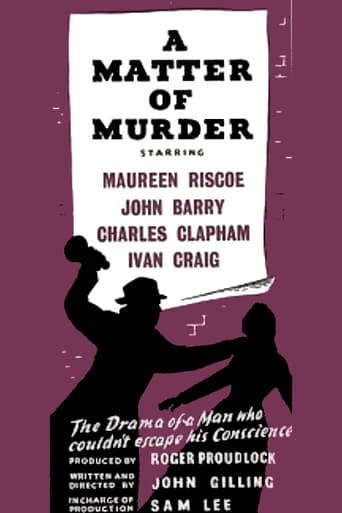jamesraeburn2003
*Caution - Enormous spoilers*A young bank clerk called Geoffrey Dent (John Barry) steals £2000 from his bank for his girlfriend Laura Wilson (uncredited) who tells him it is for her brother who she claims has fallen prey to a blackmailer. In reality, Laura is working for a ruthless criminal called Ginter (John Le Mesurier) and the pair are working a scam in order to take all the money Dent has and to steal money from the bank for them. However, Laura attempts to double cross Ginter and run away with the money herself and he kills her. Dent immediately becomes the chief suspect since he discovered the body and he was seen running away by the caretaker at her apartment block. He flees to Cheltenham and takes a room in a boarding house run by Julie McKelvin (Maureen Riscoe) whose father happens to be a senior police officer. However, Ginter has followed Dent to Cheltenham as he believes he has got the £2000 meaning his life is in danger...Long thought lost, this modest yet sometimes effective crime programmer is notable as one of the earliest features to be directed by John Gilling. There is some mild tension in the scenes at the boarding house breakfast table where Riscoe's assorted eccentric lodgers (including Colonel Peabody who listens at keyholes with his hearing aid) are discussing the murder case, which is splashed across the front page of their morning papers. Barry struggles to prevent giving himself away as the absconding bank clerk and his edginess is betrayed by a parrot that belongs to one of the guests and keeps mimicking everything that is said in the conversation. Meanwhile, the suspense is kept up by Riscoe who is falling in love with Barry and her boyfriend, the reporter Tony (Ivan Craig), is jealous and is determined to prove his theory that Barry is the criminal on the run.But, what distinguishes A Matter Of Murder and, I have to say, I wasn't expecting much from it is its particularly shocking and tragic climax. *BIG SPOILER HERE* At the end, the young and naive bank clerk dies after being cornered by Ginter and a bullet from his gun finds its mark. We are stunned when we learn that the poor guy lost his life for nothing since the police (including Riscoe's father) knew that he was innocent all along but allowed him to go on the run since it would bring Ginter out into the open as they knew he'd go after the money. Oh, incidentally, the police had already recovered it from its hiding place in the murdered girl's flat. The film's big punch is the fact that the police allowed an innocent young man to die for nothing as they could have caught their man by conventional police methods. People who have followed John Gilling's work closely might spot some similarities between this and his Jayne Mansfield crime thriller The Challenge (1960).
Paul Evans
A Matter of Murder was evidently made on a shoestring, more a c movie, then a b. It somehow feels a lot more dated then 1949, having finished watching it, I had to check to see if it was made in the 1930's.It's very slow, jam packed with stereotypes and features a whole host of characters behaving in the most unimaginable ways you could imagine. The boarding house guests would have been better suited to a sitcom then a mystery, that dreadful woman with her parrot! The only shout goes out to Le Mesurier, who does a fine job of being a villain, he's rather sinister, good to see him cast against type. Noted for being directed by the well known John Gilling, he would certainly sharpen his skills for his later projects, including Plague of the Zombies and The Reptile.A bit of a snooze fest, 5/10
kidboots
John Gilling began directing a few short features (40 minutes) at the tiny Windsor studios in central London. He and producer Harry Reynolds started with "Escape From Broadmoor", a moody ghost story about an escaped killer but unfortunately their next "A Matter of Murder" was described as a "tatty programme filler" and it was!!Billed as "the drama of a man who couldn't escape his own conscience" the film was based on Gilling's own story and concerned Geoffrey Dent (John Barry), a bank clerk who embezzles money at the orders of his girlfriend Laura Wilson. She is a gold-digger who claims that the money is needed to pay off a blackmailer but who plans to shoot through with the loot on her own. The title is a bit of a red herring considering the girl hangs onto life throughout most of the movie. It also makes for confusing viewing as the film starts with the attack on Laura and the audience is in the dark as to what is going on - you certainly don't know of Geoffrey's robbery until the story gets under way. Of course, because Geoffrey is the person seen leaving the flat, his is the description posted on the front pages the next morning but by that time he is safely ensconced in an out of the way boarding house.Boarding house types abound - there is the daffy old lady, the nosy radio ham, Vera, the sympathetic manageress and her skeptical boyfriend who feels from the start that Geoffrey is not who he claims to be. Film is only of interest for seeing John LeMesurier in an early role as a gangster.Although the film's distributor, Vandyke, worked on a shoestring budget they did manage to set up their own studio - a converted 500 seat cinema in Barnes. While they occasionally managed to persuade such names as director Val Guest and his wife Yolande Donlan to bolster the studio's prestige, it didn't manage to survive the adverse trading conditions of the late 1950s.


